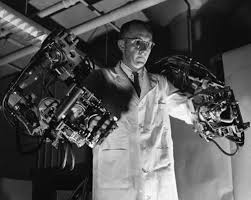AI can kill all of you humans, and Sir Clive Sinclair will not give a fig. The British computer and EV pioneer has been predicting since the 1980s that one fine morning we’ll be eliminated by self-designing intelligent machines even more unfeeling than ourselves, but he’s not letting it ruin his day. Che sera sera, you carbon-based beings. As you were. Two excerpts follow: 1) The opening of Sinclair’s 1984 “Predictions on Our Computerized Future,” and 2) a passage from Leo Kelion’s 2014 BBC piece about the inventor.
___________________________
From Sinclair:
Four thousand million years ago, when the universe was only half the size it is now and the solar system only five million years old, a singular thing happened–life. By some ineluctable process in the primordial soup, stirred by fierce cosmic rays and bolts of lightning, carbon compounds of strange complexity formed and reformed, growing in subtlety until they came to transmute sunlight and to replicate. For a billion years these first bacteria, so mysteriously conjured, clumping together to form living reefs called stromatolites, where the only life. Yet three billion years later they evolved into mankind.
I said that the event that started this process was singular and so, for all we know, it was. But so it will not long remain. All life is carbon based and carbon is exceptional in the variety of compounds it leads to, providing organisms with a rich choice of building materials. If we ever discover life on other planets we would not be surprised to find it similarly based on carbon, but it might not be so.
When I was a boy I read science fiction stories and in those days a common theme was the discovery of a life form strangely different from ours. A popular idea was for life based not on carbon compounds but on silicon on the grounds, I believe, that silicon too can form a wealth of products, many of them physically useful. Soon, I suggest, those stories will seem strangely prescient, for silicon based life will exist. IT will not have emerged from millions of years of trial and error in energetic protoplasm but from a mere century or less of man’s endeavour I am suggesting that the path the silicon based electronics industry is on will lead to life.
The human brain contains, I am told, 10 thousand million cells, and each of these may have a thousand connections. Such enormous numbers used to daunt us and cause us to dismiss the possibility of making a machine with human-like ability, but now that we have grown used to moving forward at such as pace we can be less sure. Quite soon, in only 10 or 20 years perhaps, we will be able to assemble a machine as complex as the human brain, and if we can, we will. It may then take us a long time to render it intelligent by loading in the right software or by altering the architecture, but that too will happen.
It think it certain that in decades, not centuries, machines of silicon will arise first to rival and then surpass their human progenitors. Once they surpass us they will be capable of their own design. In a real sense they will be reproductive. Silicon will have ended the long monopoly of carbon. And ours too, I suppose, for we will no longer be able to deem ourselves the finest intelligence in the knwon universe. In principle, it could be stopped. There will be those who try, but it will happen nonetheless. The lid of Pandora’s box is starting to open.•
___________________________
From the BBC:
His ZX Spectrum computers were in large part responsible for creating a generation of programmers back in the 1980s, when the machines and their clones became best-sellers in the UK, Russia, and elsewhere.
At the time, he forecast that software run on silicon was destined to end ‘the long monopoly’ of carbon-based organisms being the most intelligent life on Earth.
So it seemed worth asking him what he made of Prof Stephen Hawking’s recent warning that artificial intelligence could spell the end of the human race.
“Once you start to make machines that are rivalling and surpassing humans with intelligence it’s going to be very difficult for us to survive – I agree with him entirely,’ Sir Clive remarks.
“I don’t necessarily think it’s a bad thing. It’s just an inevitability.”
So, should the human race start taking precautions?
“I don’t think there’s much they can do,” he responds. “But it’s not imminent and I can’t go round worrying about it.”
It marks a somewhat more relaxed view than his 1984 prediction that it would be ‘decades, not centuries’ in which computers ‘capable of their own design’ would rise.•

